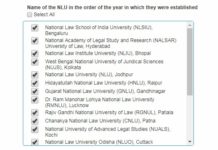To,
The CLAT Convenor,
Common Law Admission Test – 2013,
Hidayatullah National Law University.
Sir,
There has been a revolution of sorts in legal education in the last few years. Beginning with the establishment of the National Law School of India University around a quarter of a century ago, we have come a long way to having received the second batch of the fifteenth National Law University this academic year. These institutions, gaining prestige and recognition with every year, shall have upwards of thirty thousand young adults vying to gain admission into them, come May 2013. The fate of each one of them is dependent on the quality of this edition of the Common Law Admission Test, the drafting of which has been undertaken by your esteemed University.
It is in this context that we must address some of the concerns and anxieties that crop up in our minds, both as law students who wish to find the standards of our universities maintained and as mentors, who wish not to see their sincere efforts rendered futile over arbitrarily set examination papers. It is indeed unfortunate that we should even see the need to approach you in this manner, and yet we do, for there has not been one edition of this examination after the highly successful first in 2008 that has not been marred by controversy. Batch after batch of aspirants finds its efforts frustrated for lack of due care by the very hallowed portals of learning that they seek admission to, and it is in this regard that we must register our concerns.
It is our earnest desire that HNLU, a university that we have always held in the highest regard, sees a stop to what has become a trend of slovenliness. We wish that this time around, the CLAT finally becomes an examination worthy of the fourteen prestigious universities that it encompasses. Do not misunderstand us; we do not demand absolute predictability or certainty in our papers – that would indeed be detrimental to the cause of the examination. Yet, we hope that the examination actually is set to judge what is expected of a lawyer in the making.
We hope that this year, the General Knowledge segment reflects the kind of current and relevant knowledge a person engaged in the study of law ought to know of, not a random assortment of trivia that one might or might not have taken notice of. While this might diminish the ‘difficulty’ levels of the General Knowledge section; irrelevant questions open the gateways for more guess-work and more importantly, a lot more arbitrariness. As Granville Austin said, “a lawyer or a judge should be proficient in Literature, History and Political Science at the very least apart from law.” This section cannot be called perfect unless it has a fine mix of all the areas that Austin (and later Justice Gajendragadkar) mentioned. CLAT 2008 had somewhat succeeded in doing the same. On the other hand, CLAT 2010 had asked for the year in which Akbar died. We fail to understand how this piece of information becomes a test of a good lawyer. We do not seek to suggest that ‘only’ current affairs be asked – but a distinction must necessarily be made between what is relevant and what is trivial. Asking the date on which Babri Masjid went down or the year in which Purna Swaraj was declared, thus, becomes relevant.
We hope that this year, the English section contains a fair balance of questions meant to test whether the aspirant is well conversant in English. We hope this edition of the CLAT does not question the candidates on the utterly pointless antonyms and synonyms or, at the other end of the spectrum, series after series of endless comprehension exercises à la CLAT 2011. There needs to be a blend of both the test of grammar, through sentence corrections and para-jumbles, and the test of comprehension.
We hope that this year, Mathematics does not require an iteration of mere formulae that not many lawyers will ever require in their professional lives. We hope that it instead tests a person’s ability of quantitative analysis, which is fundamental to any profession. Remembering the formulae and using them in an exam to come out with an answer does not become an evidence of one’s quantitative ability. What is important is to test whether one is able to solve questions that require quantitative reasoning. However, this is not done by asking for the square root of 200 (CLAT 2010). On the other hand, consider this: A sum was divided among P, Q & R. R got double than P who got double than Q. If the difference between the shares of Q and R is Rs. 3675.00, then the sum in rupees is _______. We’ll mention another one: At a speed of 48 kmph, 60% of the journey takes 10 minutes more than the remaining part of the journey. Find the distance travelled. As far as we know, there is no one formula for it. One can either make his/her own equation, which will consume a lot of time, or one may simply apply logic and find the answer. We hope that we’ve made it clear as to what kind of questions should find place in this section.
We hope that this year, the Logical Reasoning segment challenges one’s cognitive faculties, with a variety of questions addressed at different skills required of a lawyer, unlike the previous edition and its baffling emphasis on uncomplicated syllogisms. It does not make sense to fill the paper with plenty of number series questions and syllogisms. This section has to be the most diverse one in the way one applies the mind. There needs to be a perfect commingle of both the Analytical and Critical Reasoning questions, with emphasis on what would best test a future lawyer’s faculties.
We hope that this year, the Legal Aptitude section requires the complex reasoning, deduction and analysis that any lawyer worth his salt ought to master. CLAT 2011 could, somewhat, do justice to this section. Further, what is required to be tested is the legal ‘reasoning’. Law Schools seem to forget that the legal ‘knowledge’ component can wait till the students enter a law school. Even if you find it necessary to include the ‘knowledge’ questions, we hope that the questions are relevant to the current events. Asking what the 114th Amendment of the Constitution proposes to do would be sensible rather than asking what Article 143 of the Constitution speaks of. We hope that this section truly forms the bedrock of an exam purposed to select the finest legal talent in the country, breaking away from the several clumsy attempts that have gone by.
We hope that this year, the examination remains free of the errors that one has nearly come to expect of the examination. We hope that this time on, there are no leaked papers and underlined answers. We hope that the execution of this edition of the examination is orderly and clinical, the way that of an examination of this stature is expected to be.
It is with these hopes that we write this letter, hoping finally that it does not fall upon deaf ears. There is an urgent need for reform in the way the examination has been conducted, and your esteemed institution has the opportunity to affect such a reform. As an examination that controls the fate of so many, it is essential that its question papers do not further display the arbitrariness and the nonchalance that is increasingly becoming characteristic of it. We hope that this letter, even if only in a small way, contributes in turning things around.
Sincerely,
CLATGyan.
[This has been mailed to the CLAT Convener and to the Vice Chancellors and the Registrars of all the fourteen National Law Universities. Our friends at HNLU have agreed to submit a hard copy of this to the Vice Chancellor and the Registrar of HNLU, once the University resumes for the next semester.]















Thanks for being so generous guys.. 🙂
Thanks a ton..!
I really hope they listen to your suggestions. *fingers crossed*
thank you guys for the initiate.. we really need it.
hope they listen to it as well..
Well done, Asad!
Written to the point, I hope that it proves to be efficacious and the desired authorities find it efficiently educative. I was praying to God that Katju sir would show some activism concerning arbitrariness of CLAT, but I am still very pleased to see the momentous activism coming from the people who are more close to the examination and the aspirants, and are likely to be heard.
This was actually needed, but hnlu must pay at least some amount of heed to this letter.
I think convener of CLAT should study the system of IIT jee for allotment of seats and declaration of result. I think priority of Law schools i.e. counselling should be done after declaration of result so unnecessary burden of fees transfer from one Law school to another and unwilling candidates can be avoided.
thanks of an effort to increase our alacrity and confidence to crack it like a protagonist………….
🙂
Wow! This is really incredible! I hope the convenor actually pays heed to this letter.
I hope this letter makes them understand and that CLAT 2013 is a decent if not easy exam!
THANK YOU 😀